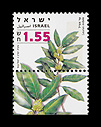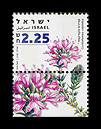|
Edible and aromatic plants have been used as folk medicines, herbs to enhance food, cosmetics, and for ritual purposes from the earliest history of man. The use of medicinal plants, herbs and spices developed in all parts of the world based on indigenous local plants which served as the underpinning for folk medicine and the distinctive cuisine of various cultures. The desire for authentic spices led to the development of trade and supply routes between distant lands, for example the Spice Route which linked the Far and Near East to Europe. Today, folk medicine, which is based on plants, is an integral component of alternative medicine as well as a basis for new developments in mainstream medicine.
The use of herbs and medicinal plants in Eretz Israel is mentioned frequently in the Bible and the Talmud, playing an important role in rituals and in daily life. Indigenous herbs have regained popularity in Israel in recent years. Alongside increased use of these herbs, the cultivation of them has developed into an important export branch.
Bay leaves
(Laurus nobilis, (L.); ar atsil, Heb.; a'ar, Ar.)
Bay leaves grow on the laurel tree, which in ancient Roman times was a symbol of victory, with the leaves fashioned into wreathes to crown heroes and victors. The tree belongs to the Lauraceae family. Its aromatic leaves are stiff and have a dark green color. The tree grows wild in northern Israel.
Uses: As a spice in meat dishes, vegetables, soups, pickling, foods and dried figs.
Wild thyme
(Coridothymus capitatus, (L.) Reichend. f.; koranit mekurkefet, Heb.;
za'atar parsi, Ar.)
A member of the Labiatae family, it grows wild in Israel. It is distinct from thyme, which is not indigenous but is cultivated extensively. A perennial, wild thyme has small leaves and a compact shape.
Uses: Besides its use as a spice, its aromatic oil is used in folk medicine as an antiseptic, to treat tics, and as a restorative drug. Yemenite Jews recommend sucking its leaves to relieve toothache.
Dr. Nativ Duda'i and Prof. Eli Putievsky
Medicinal and Aromatic Plants Unit
Institute of Botanical Sciences, Newe Ya'ar
Agricultural Research Organization, Israel


